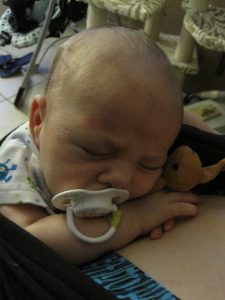It’s important to ensure proper infant sleep and to find out if problems sleeping may be due to a sleep disorder.
Infants sleep a lot. Infant sleep can last about 16-17 hours per day. Why are mom and dad so tired? Infants wake often to feed, about 8-12 times/day. Baby will often fall asleep after drinking milk/formula, and about 90 min to 3 hours, the cycle starts again. You are lucky to have the chance to sleep more than a 3 hour stretch in the first week your baby is home with you. Don’t start cursing and crying just yet, there is a way to help both mom, dad and baby sleep.
A child that is not sleeping through the night, despite being consistent with sleep times, may be suffering from a sleep disorder.
The 90 min cycles of feeding and sleeping are pretty regular in most healthy infants, you can try to at least nap during these times in the day. If you have an older child, this may be a good opportunity to put baby down for nap time. Most infant sleep will be longer stretches by 3 months, nightly feeding may still occur, but may only occur once throughout the night.
The problem many new parents experience is how to put their sleeping infant in his/her crib without waking him/her. Infants have not developed the neural and circadian mechanisms to ensure sleep consolidation, this is why they cry and fuss. They may need a self soothing/sleep inducing technique. That is where mom and dad can help. Many parents will let the baby fall asleep on the bottle or breast. This can easily lead to a sleeping baby but letting your baby stay in bed with you can harm your child. Health Canada recommends room sharing for the first 6 months of life using a separate crib/bassinet with a firm mattress. The best way really depends on what works best for mom and dad i.e. rock baby then place in crib; feed baby place in crib; or let sleeping baby sleep and not sleep; taking turns between parents etc…
If you are past the ticking time bomb that is passing around a sleeping infant, and now you have an older child that is not sleeping through the night he/she may be suffering from a sleep disorder. Speaking to your paediatrician is the first step to discussing sleep issues, he/she will be best able to determine if the lack of sleep is due to a sleep disorder.
Bedtime problems are common in 20-30% of infants, toddlers and preschoolers. Studies have also show that sleep problems occurring in infancy may persist into preschool and grade school and may become chronic. Sleep disruption and/or insufficient sleep has negative effects on children’s cognitive development, mood regulation, attention, and behavior, as well as health and overall quality of life. A polysomnography may be needed to rule out medically caused sleep problems. Sleep monitoring for children can be done in the home to help with any fear of unfamiliar spaces. Actigraphy (monitoring movement) and video may be all that is needed to determine certain sleep disorders in children.
What works in getting children to bed is a consistent bedtime routine with activities like reading to help encourage sleep and a scheduled wake time. Of course, we need to adjust bedtime and wake time for our children every time we fall forward or spring back for daylight savings. Again, consistent sleep routines will help, maybe going to bed later in the summer months works best for you and your family.
Whatever age your child is, just remember your time with them is so fleeting, so hold them a little longer, rock them a little more, tell them another story, you’ve only told them 4, let them sleep on your shoulder, rejoice in their happy smiles, they are little children of such a little while.


I blog frequently and I truly appreciate your
information. The article has truly peaked my interest.
I’m going to bookmark your site and keep
checking for new details about once per week.
I subscribed to your RSS feed too.